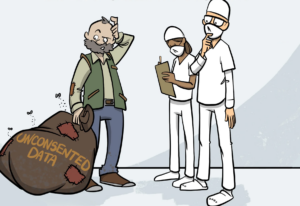Ebiquity shook the industry when it dropped its report on media transparency two years ago. Advertisers and agencies alike still reel from its impact.
As a consultancy Ebiquity isn’t as flashy as others, like MediaLink or Accenture – both of which plastered the Croisette with their branding. Still, some of Ebiquity’s activities after the K2 report gave agencies pause. Was a new competitor entering the arena?
No, says Ebiquity, which has 20 offices and 1,000 people across 14 countries and entered into an agreement to sell its advertising intelligence business to Nielsen in February.
Its media practice does three main things. One unit analyzes media-buying performance. A second helps with agency selection and ran $5 billion worth of pitches last year. And a third uses financial auditors to check on contract compliance.
Outside of media, Ebiquity does “advanced analytics,” which includes functions such as pricing, attribution modeling and optimizing conversion rates. It’s also got a technology consulting practice under its umbrella.
“We help clients make the right decisions for advertising and marketing technology investments, in particular in programmatic trading,” said Ebiquity Group CEO Michael Karg.
It’s that tech consulting practice, Karg explains, that created the most confusion about Ebiquity’s offering with agencies.
He and Alan Rutherford, Ebiquity’s global chairman of media, spoke with AdExchanger.
AdExchanger: Some agencies believe you’re competitive with them. Are you?
MICHAEL KARG: When we launched the technology consulting practice, there was some misunderstanding of what that actually means. The agency groups were concerned that we were building something similar to what Accenture was doing. We’re not. We don’t own technology, we don’t buy media, we don’t trade media. Our technology advisory is purely to help clients in the decision-making practice and in the internal setup.
ALAN RUTHERFORD: We’re probably the only truly independent consultant that exists that can advise CMOs and the advertising businesses. Accenture has its programmatic side, which they want to sell into advertisers. They’ve got Accenture Interactive and own agencies as well. The conflict of interest that exists there is enormous. They also do media benchmarking – not to the scale we do, but they do it.
Our job is to give clients the best advice, whatever that may be. Others have relationships with media agencies or owners, or they’ll be headhunters. The conflict of interest is huge.
A competitor of ours quite well connected to this conference has a very strong relationship with a number of media agencies and has been paid by media agencies. How can it also then advise clients in a truly impartial manner?
The competitor you’re referring to has been clear about its networking capacity.
RUTHERFORD: They’re clear about some of their networking capacity. It’s interesting, because I funded [the founder of that company] when I was at Unilever to get him started. But that was to advise us as a client, not to take money from agencies.
What about EY and PwC?
RUTHERFORD: They don’t have the capability. They just don’t.
KARG: One very significant and recent example is PwC advising the ISBA [Incorporated Society of British Advertisers], which is the equivalent of the ANA in the UK. They were advising them on the next generation of media agency contract frameworks and it became clear that they don’t have the level of skill or expertise to provide advice in that area.
Agencies have complained that advertisers sometimes claim to want something complex and innovative in the RFP. But then the advertiser turns around and says they want the lowest price on media.
RUTHERFORD: I’ve seen it on both sides. I’ve seen RFPs responded to in the way an agency thought, and suddenly the game changes. Sometimes they change it themselves. If they think they’re not in a commanding position, they’ll switch the conversation to another metric to get themselves back in pole position. It’s not just advertisers.
One of the key pushes we’re making is how we professionalize the industry as it matures and as complexity increases. We’re all somewhat guilty of relying on old practices.
At Ebiquity, we’re putting together with the holding companies best practices on how [agency] RFPs should be managed. It will affect advertiser needs, consultancies and media agencies. If you can get the best practices out there and people thinking the same way, that’s one way to move ahead.
You mentioned professionalizing consultancy activities as well.
RUTHERFORD: In the area of media benchmarking, there’s always discussion of what the data means and how it’s put together. We’re putting rules around data provisions from agencies – what can go into a benchmarking pool, what can come out. We’ve seen some consultants take data provided in pitches that goes into their data pool. That’s not real market data, though, and shouldn’t be used.
What percentage of pitches do you typically run?
RUTHERFORD: I’m guessing we do about 60%. We did over 100 pitches last year and we will do more this year.
Why are all these pitches happening again?
KARG: There are too many pitches going on. 2015 was a big year and people are saying ’18 is bigger than ’15. We haven’t quite seen that yet, but it could get there.
It’s not good, because if you are an advertiser and you start pitching your business at the same time everyone else is pitching, you won’t get the level of attention from the agency groups if they’re already doing 10 or 15 pitches.
From the agency perspective, it’s very expensive and resource-intense. From our perspective, advertisers might have contractual reasons or governance reasons why there must be a pitch, but there are often reasons why there shouldn’t be a pitch.
Often, clients will pitch because they want a better rate or because they want to keep the agency on their toes. That’s not a good reason to do it. And it’s not a good use of resources.
RUTHERFORD: Sometimes an advertiser needs to put a catalyst in place to kickstart change or get their marketers to rethink their approach to how they put their brand communication plans in place. Those are reasons for doing a pitch – and I know that from my Unilever experience.
KARG: I’m not saying there should be no pitches. There’s just too many at the moment. The transition costs are significant. It takes a long time to onboard a new partner, to educate a new partner, to offboard the existing partner – and it’s very disruptive. So, unless you have a real reason to do it, like internal changes or to drive some business outcome, then you shouldn’t.














